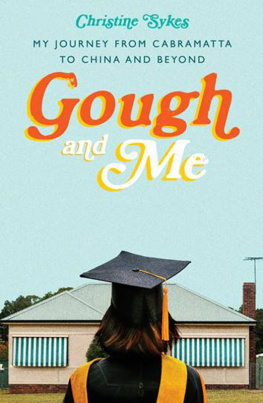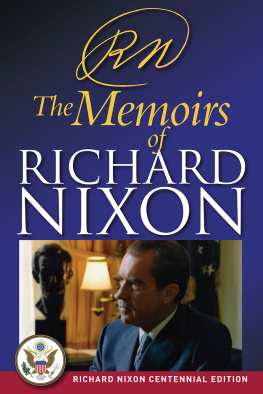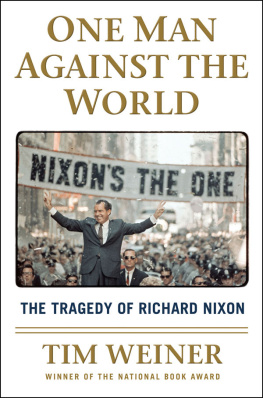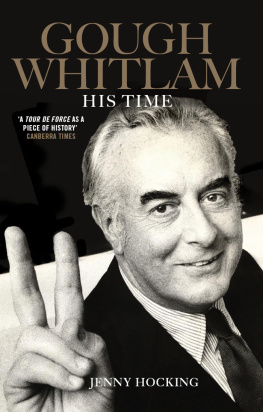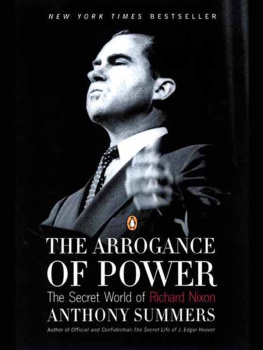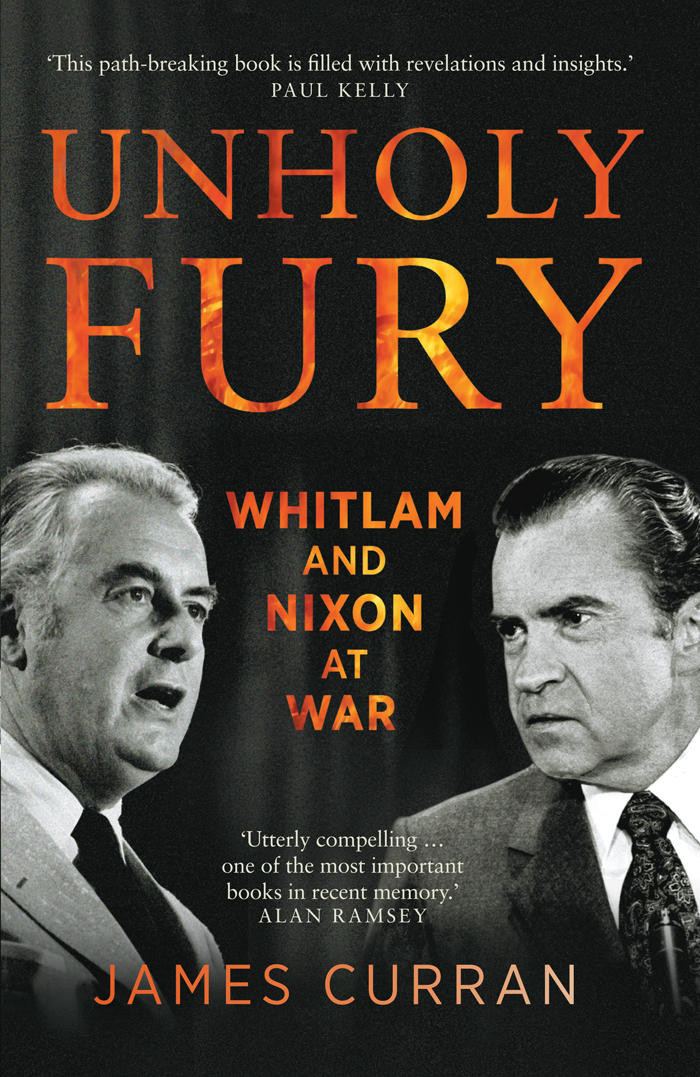PRAISE FOR UNHOLY FURY
An utterly compelling story wonderfully told. A new prime minister, Australias first Labor head of government in almost a quarter of a century, confronts a wilful, no less spiteful US president newly re-elected yet one already under siege to domestic events which ultimately destroy him. The visitor is determined to set Australia on a more independent foreign policy. Washington, grown used to sycophants from Canberra, is equally adamant to bring him to heel. James Curran has written one of the most important books of recent memory.
Alan Ramsey
This path-breaking book is filled with revelations and insights. It is the story of Australia coming to maturity.
Paul Kelly, Editor at Large, The Australian
This important book reveals for the first time the full depth of the rift between Australia and its key ally during the Whitlam years. Enlightening and entertaining in equal measure, sparkling with wit and insight, Unholy Fury shows how Gough Whitlams effort to redefine the alliance so antagonised the Nixon administration that it considered abandoning ANZUS altogether. Drawing on rich research in newly declassified sources in both countries, the book provides a compelling, sometimes laugh-out-loud account of the personalities and politics of the eraand offers much to ponder for anyone interested in the AustralianUS relationship today.
Barbara Keys, Associate Professor of History, University of Melboune
Unholy Fury is both an elegant and illuminating account of a crucial moment in Australian and American diplomatic history, and a much-needed meditation on the tangle of risk and politics at the heart of the ANZUS alliance.
Michael Wesley, Professor of International Affairs, Director,
Coral Bell School of Asia Pacific Affairs, ANU College of Asia and the Pacific
The AustralianAmerican relationship has probably only suffered one really bad moment: and this is it, the subject of James Currans superbly researched and written account of the NixonWhitlam era. Its more than a history of this moment, however. Its a book about the dilemma both Australia and America face in managing an alliance relationshipbristling with dangers as well as mutual advantage.
Bob Carr
ALSO BY JAMES CURRAN
THE POWER OF SPEECH: AUSTRALIAN PRIME MINISTERS DEFINING THE NATIONAL IMAGE
(MUP, 2004)
a rare and welcome beast: a work of scholarship that is eminently and compellingly readable.
Adelaide Review
Curran is persuasive in showing how much ideas matter. This comprehensive history of the stories our prime ministers have told is essential reading.
James Walter, Age
An important, intriguing book that demonstrates how politicians have wrestled with the idea of what makes an Australian and how we should relate to the world since the 1940s Curran is a subtle thinker who has distilled meaning from a mass of documents
Stephen Matchett, Weekend Australian
this important book is not only a significant contribution to the identity debate and to prime ministerial biography but to contemporary Australian history. Curran has succeeded in showing how prime ministers from Curtin and Chifley to Keating and Howard have interpreted Australian history, Australian society and Australias place in the world.
NSW History Awards, 2005
THE UNKNOWN NATION: AUSTRALIA AFTER EMPIRE
With Stuart Ward (MUP, 2010)
this excellent study presents what is likely to be an influential interpretation of an important aspect of the recent past a significant book, and certainly a landmark.
Frank Bongiorno, History Australia
illuminating and entertaining this book sheds new light on the political, cultural and intellectual history of the post-war period in Australia.
Prime Ministers Prize for Australian History, 2011
A thoughtful book Curran and Ward show skill in handling the history of ideas.
Geoffrey Blainey, Spectator Australia
CURTINS EMPIRE
(Cambridge University Press, 2011)
a fine and important book sheds new light on the shadowy and evasive Curtin.
Hugh White, American Review
an elegant mix of scholarly research and accessible prose an important addition to Australias history.
Canberra Times
Curran is one of a number of historians who have identified this phenomenon of British race patriotism, which exercised such a powerful influence in this first half of the last century and is so incomprehensible today.
Stuart Macintyre, Australian Book Review
UNHOLY
FURY
WHITLAM AND NIXON AT WAR
JAMES CURRAN

For Priscilla, Pia and Ella
MELBOURNE UNIVERSITY PRESS
An imprint of Melbourne University Publishing Limited
1115 Argyle Place South, Carlton, Victoria 3053, Australia
www.mup.com.au
First published 2015
Text James Curran, 2015
Design and typography Melbourne University Publishing Limited, 2015
This book is copyright. Apart from any use permitted under the Copyright Act 1968 and subsequent amendments, no part may be reproduced, stored in a retrieval system or transmitted by any means or process whatsoever without the prior written permission of the publishers.
Every attempt has been made to locate the copyright holders for material quoted in this book. Any person or organisation that may have been overlooked or misattributed may contact the publisher.
Cover design by Design By Committee
Typeset by Megan Ellis
Printed in Australia by McPhersons Printing Group
National Library of Australia Cataloguing-in-Publication entry
Curran, James, 1973- author.
Unholy fury: Whitlam and Nixon at war/James Curran.
9780522868203 (paperback)
9780522861754 (ebook)
Includes bibliographical references and index.
Whitlam, Gough, 19162014.
Nixon, Richard M. (Richard Milhous), 19131994.
Vietnam War, 19611975Australia.
Vietnam War, 19611975United States.
AustraliaForeign relationsUnited States.
United StatesForeign relationsAustralia.
327.94073
CONTENTS
Hes one of the peaceniks [and] certainly putting the
Australians on a very, very dangerous path.
PRESIDENT RICHARD NIXON ON GOUGH WHITLAM, DECEMBER 1972
For all its enduring importance, adherence to ANZUS
does not constitute a foreign policy.
GOUGH WHITLAM, JANUARY 1973
He is a bastard.
HENRY KISSINGER ON GOUGH WHITLAM, JULY 1974
ON THE RIGHT SIDE:
NIXON IN AUSTRALIA
In October 1953 the United States vice president, Richard Milhous Nixon, arrived in Australia as part of an extensive tour of Asia and the Pacific. He was the most senior serving American politician ever to visit the country. Coming only eight years after the end of World War II and barely two years after the signing of the ANZUS treaty in September 1951, Nixons arrival served as a powerful reminder of American triumph in the battles of the Pacific and a symbol of the US commitment to Australia in a dangerous Cold War world. During a seventy-day international odyssey Nixon also called in on nineteen other countries, as well as Hong Kong and the Japanese island of Okinawa. None of these places had ever before had a visit from an American vice president or president. For a political figure whose later time in the Oval Office would come to be dominated by Asia, the trip was an unprecedented opportunity to meet many of the leaders with whom he would do business over the next two decades. It gave him a chance, he later recalled, to assess Asian attitudes toward the emerging colossus of Communist China. Nixon, who was well known for his relentless anti-communist crusade on the American home front, was now stepping onto the world stage.


